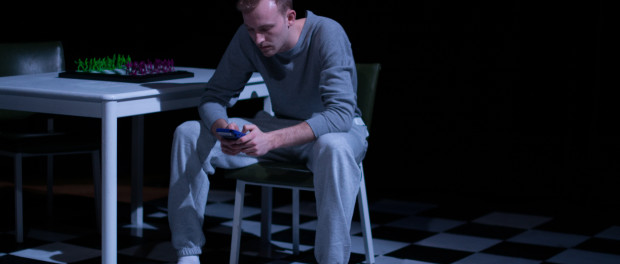Review : The Ambitions of Burning in Water, Drowning in Flame
Tuesday Night Café’s March offering Burning in Water, Drowning in Flame is a futuristic play that attempts to critique war, the detached state of our humanity and our inability to connect with anyone outside of us. Set in 2045, director Ali Vandekruyk draws us into the worlds of four veterans, whose blocked memories owing to the war-administered drug Ephembrium, keeps them in a constant state of the present, as if the war they fought in never really ended. Inspired by the works of American poet and writer Charles Bukowski, Vandekruyk half-successfully creates a haunting, yet static emotional and physical piece, which is a metaphor for our modern world in a constant state of war.
The first half of the play unravels in the rec room of a care facility in the year 2045. The war that lasted between 2015-2021 has ended. One by one the inmates stream into the recreation area as they dabble in the reality of sometimes frenzied and then sudden subdued state of being. We open with Tate (Thoby King) and Marty (Nicholas LePage), as these two friends witness the slow deterioration of a friendship.
Tate is rambunctious and verbose in his fixed memories of war. He uses a toy gun aiming it at Marty, pretending to be shooting him perpetually, using this as his catharsis in this post-war reality. His thoughts run back and forth between taking orders at the front lines and then back to present time. Marty, on the other hand, is quiet and has monosyllabic responses to everything. He is engrossed in a handheld video game, which remains his main source of entertainment, engagement and distraction from the omnipresent sense of war. They both stand at opposite ends and speak to the shared experience of a lost humanity.
These inmates are forced to continue living with the after-effects of being drugged into fighting for senseless and hypocritical ideas of justice and peace, while high on Ephembrium, which acts as an anxiolytic that provides aggression and unhindered fighting. This loss of self speaks to the reality of thousands, if not millions of people who have been hapless victims of the wars we have created as the most violent species that has inhabited this planet.
While Marty and Tate continue to stumble through their mind space, the two other inmates Haydee (Jedidah Nabwangu) and Lane (Ruthie Pytka-Jones) bring to the stage a vulnerable reality. While Haydee is confined to silence (both verbal and bodily), Lane is anxiety ridden, fidgety and humorously tragic. Jedidah and Ruthie by far deliver strong performances and expose how bereft we humans have become of even the slightest trace of raw intimacy.
The underlying goal of the play is its anti-war message. It also tries to comment on so many other things: from the haplessness of nation states in the 21st century to the remnants of war and their permanence in our psyche. It talks about rampant use of drugs during wars and other conflict zones to dehumanize and create robotic war machines and eludes to the complete detachment from being able to feel human emotion, where even someone’s touch seems abhorrent.
The second half of the play takes us back to a bar, on the last day of recruitment before the war. The bar has a revolutionary, anti-war anarchist Lola (Ruby Iacobelli), who has stationed herself there to try and convince people who are showing up to enlist not to join the war effort. She blatantly calls “wars” a masochistic playing out of men’s phallic obsession, comparing a penis to a weapon and how shooting a gun is just another form of squirting from one’s penis. That, in her opinion, is what most men do and what takes them to war every time. Her ruthless description of men, their ideas of masculinity and truth of why wars are even fought is rather daring, direct and deliciously funny. A highlight of the play! Her recruit is a calmer Chloe (Claire Morse) who attempts to use conversation as her way to do the convincing.
The play uses monologues as a direct dialogue with the audience. It’s an interesting attempt to blur the line between stage and the public; however it is not able to break through the wall of incoherence of the actors, which should have been deliberate given the subject matter. I know the themes, I get the ideas that are being explored, yet I don’t know who my characters are, I don’t know their real stories, nor do I really relate to them. Marty and Chloe’s characters try to open windows to their lives towards the end, and only slightly. Vandekruyk also places a large projected screen in the middle of the stage, which acts as extended representation of their thoughts and in the second half an intriguing play with a display of text messages between Marty and Chloe. The set design was quite competent and managed to create an eerie sense of our commonly lost sense of empathy.
Burning in Water, Drowning in Flame is quite ambitious, yet it struggles through its narrative. It is worth a dekko for who we have become and how our constant state of conflict is pushing us down a precipice, each and every one of us.
The play runs from Wednesday, March 25 to Saturday, March 28. Performances start 8 P.M. at Tuesday Night Café Theatre (3485 McTavish)








